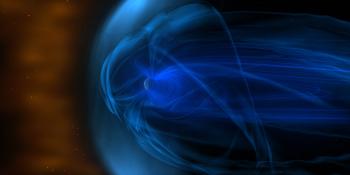Viewing archive of Wednesday, 2 July 2003
Solar activity report
Any mentioned solar flare in this report has a scaling factor applied by the Space Weather Prediction Center (SWPC). Because of the SWPC scaling factor, solar flares are reported as 42% smaller than for the science quality data. The scaling factor has been removed from our archived solar flare data to reflect the true physical units.
Report of Solar-Geophysical Activity 2003 Jul 02 2200 UTCPrepared by the NOAA © SWPC and processed by SpaceWeatherLive.com
Joint USAF/NOAA Report of Solar and Geophysical Activity
SDF Number 183 Issued at 2200Z on 02 Jul 2003IA. Analysis of Solar Active Regions and Activity from 01-2100Z to 02-2100Z Solar activity was moderate. Region 397 (N10E13)
produced an M3/1f at 0728 UTC. The group has shown some decay of the
spots in the middle portion of the group and loss of the delta
configuration, but there has been some growth in the trailer spots.
The magnetic classification for the group is now beta-gamma,
reflecting its multiple inversion line structure. Region 400
(N04E58) has rotated more fully into view as a small, D-type region
and managed to produced a C1/Sf.
IB. Solar Activity Forecast
Solar activity is expected to be
mostly low, but there continues to be a fair chance for an isolated
M-class event during the next three days from Region 397.
IIA. Geophysical Activity Summary 01-2100Z to 02-2100Z
The geomagnetic field was mostly unsettled during the past 24 hours.
Solar wind conditions were nominal until about 1800 UTC when an
increase was observed in speed and temperature and a decrease was
observed in density. This might indicate the onset of the
anticipated high speed solar wind stream. The greater than 2 MeV
electron fluxes were at high levels during the past 24 hours.
IIB. Geophysical Activity Forecast
The geomagnetic field is
expected to be unsettled to active for the next 24 hours, and mostly
active for the second and third days. The increase is expected as a
result of a high speed wind stream associated with a favorably
positioned coronal hole. There is a possibility for isolated storm
periods, particularly at the higher latitudes.
III. Event Probabilities 03 Jul to 05 Jul
| Class M | 40% | 40% | 40% |
| Class X | 05% | 05% | 05% |
| Proton | 05% | 05% | 05% |
| PCAF | green | ||
IV. Penticton 10.7 cm Flux
Observed 02 Jul 135 Predicted 03 Jul-05 Jul 140/145/150 90 Day Mean 02 Jul 123
V. Geomagnetic A Indices
Observed Afr/Ap 01 Jul 014/013 Estimated Afr/Ap 02 Jul 012/014 Predicted Afr/Ap 03 Jul-05 Jul 015/020-020/025-020/025
VI. Geomagnetic Activity Probabilities 03 Jul to 05 Jul
| A. Middle Latitudes | |||
|---|---|---|---|
| Active | 35% | 40% | 40% |
| Minor storm | 20% | 25% | 25% |
| Major-severe storm | 10% | 10% | 10% |
| B. High Latitudes | |||
|---|---|---|---|
| Active | 30% | 30% | 30% |
| Minor storm | 25% | 30% | 30% |
| Major-severe storm | 10% | 15% | 15% |
All times in UTC
Latest news
Latest forum messages
AR4069 2Filaments and prominences 82Ask your obscure/"stupid" space weather questions. 368Fulguration events between unnumbered and numbered active regions, almost at the same time. 2AR 4065 12
More topicsSupport SpaceWeatherLive.com!
A lot of people come to SpaceWeatherLive to follow the Sun's activity or if there is aurora to be seen, but with more traffic comes higher server costs. Consider a donation if you enjoy SpaceWeatherLive so we can keep the website online!

Space weather facts
| Last X-flare | 2025/03/28 | X1.1 |
| Last M-flare | 2025/04/22 | M1.3 |
| Last geomagnetic storm | 2025/04/21 | Kp5+ (G1) |
| Spotless days | |
|---|---|
| Last spotless day | 2022/06/08 |
| Monthly mean Sunspot Number | |
|---|---|
| March 2025 | 134.2 -20.4 |
| April 2025 | 120 -14.2 |
| Last 30 days | 111.9 -31 |


